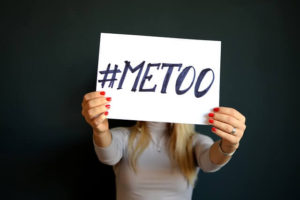It seems every day there are more celebrities accused of groping and sexual harassment. (Here is a running list of stars who allegedly committed sexual misconduct). This has also started a #metoo campaign, where women across the Country are sharing their stories of having to endure inappropriate sexual comments or touching. Unfortunately, sexual harassment is all too common in the workplace, and it has largely gone ignored under the boys-will-be-boys attitude. Thankfully, since the allegations have surfaced against Harvey Weinstein, women and men across the country are getting the courage to confront their abusers. Now is as good of time as any to review laws that protect employees in Illinois from sexual harassment in the workplace.
What is Sexual Harassment
In order to show sexual harassment (or  a hostile work environment), the employee needs to show (1) she was subjected to unwelcome sexual conduct, advances, or requests, (2) because of her sex, (3) that were severe or pervasive enough to create a hostile work environment, and (4) that there is a basis for employer liability.
a hostile work environment), the employee needs to show (1) she was subjected to unwelcome sexual conduct, advances, or requests, (2) because of her sex, (3) that were severe or pervasive enough to create a hostile work environment, and (4) that there is a basis for employer liability.
Often the biggest issues is determining whether the conduct was severe or pervasive. As a general rule, is there is uninvited physical conduct, likely only one instance is enough to be considered severe and pervasive. Alternatively, if the employee is subject to vulgar banter, or inappropriate sexual comments by co-workers, it will likely need to continue for a period of time to be deemed pervasive. Whether the conduct will be deemed severe or pervasive will depend on the frequency, its severity, whether it is physically threatening or humiliating, and whether it interferes with the employee’s work performance.
Quid Pro Quo Sexual Harassment
There is also quid pro quo sexual harassment, which is all too common. This occurs where submission to sexual demands is made a condition of tangible employment benefits, or submission to or rejection of such conduct is used as the basis for employment decisions affecting the individual. This often happens when a supervisor requires a subordinate to submit to some form of sexual conduct in order to be promoted, given a raise, or keep employment with the company. Although this type of sexual harassment might seem more consensual, it is just as illegal and repulsive as all other types.
Time Limitations
Bear in mind that in order to successfully pursue a sexual harassment claim, you or your attorney must first file a charge of discrimination with the Equal Employment Opportunity Commission or the Illinois Department of Human Rights. If filed with the EEOC, the charge must be filed within 300 days of the illegal conduct. If filed with the IDHR, it must be filed within 180 days. In determining the last date of illegal conduct, if there is a violation that continues over a period of time, the employee can obtain relief by linking all acts with the last act that falls within the limitations period.
If you have been subjected to sexual harassment, contact an attorney immediately.

